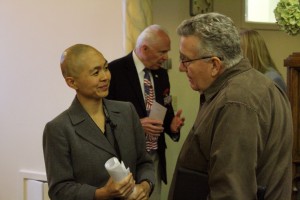A global religions expert believes the experiences of Asian Mormon pioneers are just as much a part of Mormonism’s heritage as are the experiences of the early Mormon pioneers who trekked westward to the Salt Lake Valley.

“Mormonism is an increasingly global and multi-ethnic religion,” professor and researcher Melissa Wei-Tsing Inouye said in a presentation titled “China, Japan, and Utah: The Transitional Passages of a Mormon Family.”
Inouye said although the church continues to diversify, the dialogue surrounding it has not reflected diversity. Attendees were taught that the gospel of Jesus Christ can seamlessly be a part of their lives, no matter what culture they are from.
to diversify, the dialogue surrounding it has not reflected diversity. Attendees were taught that the gospel of Jesus Christ can seamlessly be a part of their lives, no matter what culture they are from.
Inouye spoke at Temple Square on July 9 about her research on and experiences with Mormon and Asian cultures. She earned her Ph.D. in East Asian Languages and Civilizations from Harvard University. She researches the history of Christianity in China and the study of global Mormonism. She currently works at the University of Aukland as a lecturer.
her Ph.D. in East Asian Languages and Civilizations from Harvard University. She researches the history of Christianity in China and the study of global Mormonism. She currently works at the University of Aukland as a lecturer.
In addition to her resume , Inouye’s personal experiences give her a unique perspective on her area of research. Her father’s family comes from China, and her mother’s from Japan. Raised in the U.S. in California, Inouye identifies as a Chinese-Japanese American. She also spent time in Taiwan while serving as a missionary for the LDS Church.
, Inouye’s personal experiences give her a unique perspective on her area of research. Her father’s family comes from China, and her mother’s from Japan. Raised in the U.S. in California, Inouye identifies as a Chinese-Japanese American. She also spent time in Taiwan while serving as a missionary for the LDS Church.
In her talk, Inouye shared stories of how her grandparents on both sides became members of the LDS Church and described some of the discrimination they faced for holding the status of a “double minority,” or being Mormon and of Asian descent.
During World War II, Japanese and other Asian Americans were put in prison camps and viewed as traitors. Inouye compared her ancestors’ experiences to history’s mistreatment of Mormons, who were at times labeled as “un-American” for their beliefs and heritage. She said both groups have rich histories that help make up the heritage of Mormonism.
She compared the church to a flowing river that gradually picks up sediment as it carves out its path. Each new piece of sediment, or each convert, contributes to the river, or the church.
“Mormonism is a lived religion, and those who live it also define it,” Inouye said.
Rachel Riter, who works at the LDS Church Office Building, attended the lecture and was impacted by Inouye’s metaphor.
“When we stop focusing on us as Mormons and have a more open view of the world, we can relate to more people, and more people come to us,” she said.
Many of Inouye’s family members were also in attendance. Relative Lily Lew said she liked the message that the church truly is global.
“As long as families are important, then the gospel is relevant,” Lew said. “You don’t have to turn away from your culture or your ethnicity.”
Lew and her husband currently live in China, where are only five approved religions: Buddhism, Taoism, Islam, Protestantism and Catholicism. All other religions have either “black market” or “gray market” status, as Inouye explained it.
“Black market” religions are banned as illegal; practicing them can result in punishment. “Gray market” religions, on the other hand, do not have as many restrictions. The LDS Church falls under the category of “gray market” religion.
Chinese members of the LDS Church are able to attend church on Sundays. The church’s website on relations with China explains that this has been the case since 2004. Law does, however, require that worship services for foreign-passport-holding Latter-day Saints are separate from services for Chinese members.
Relations with the Chinese government continue to improve as the LDS Church respects the laws in place and promotes understanding of different cultures.
to improve as the LDS Church respects the laws in place and promotes understanding of different cultures.
Inouye’s lecture was part of the the LDS Church History Library series called Pioneers in Every Land. Each month a different speaker is invited to talk about his or her experience with the church in a different part of the world.
The next lecture, titled “Fire on Ice: The Story of Icelandic Latter-day Saints at Home and Abroad,” is scheduled for Aug. 13 at the Assembly Hall on Temple Square. Lectures are free and open to the public. Past lectures are available for viewing at history.lds.org.
and Abroad,” is scheduled for Aug. 13 at the Assembly Hall on Temple Square. Lectures are free and open to the public. Past lectures are available for viewing at history.lds.org.




